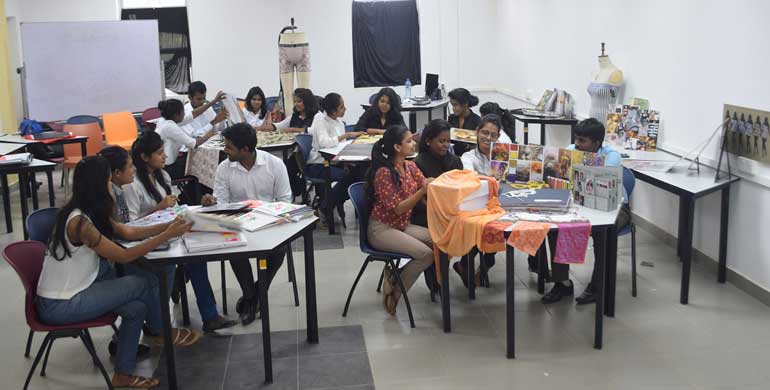Friday Feb 20, 2026
Friday Feb 20, 2026
Monday, 14 March 2016 00:00 - - {{hitsCtrl.values.hits}}

Four teams from UOM who provided solutions for TJ customers

Teams at work
Textured Jersey (TJ), the region’s largest textile manufacturing company, again extended its support to undergraduates of the Department of Textile and Clothing of the University of Moratuwa (UoM). The initiative which begun in 2014, has to date enabled students to bring some remarkable customer solutions to the market. This year TJ plans to further empower students by using some of their innovative fabric solutions to meet customer expectations.
The Department of Textile and Clothing Technology, which comes under the Faculty of Engineering, is the first of its kind amongst State universities in Sri Lanka. Students following this course are taught a wide range of subjects, textiles for designing, fashion designing, fashion forecasting, garment technology, pattern cutting, fashion illustration as well as fashion marketing with an industrial perspective, which are requisites to become successful in the world of fashion.
Commenting on TJ’s involvement, Senior Lecturer of Fashion Design and Product Development programme at the University of Moratuwa, Dr. G. M Ranatunga said: “Fashion designing is taught on project-based method with an industrial perspective, so we train our students to meet industry expectations. From year one to year two they gain lots of academic knowledge with practical examples and with the help of Textured Jersey, this year they have been able to gain real time industry experience. Year three and year four are called concept realisation where they work closely with the industry to develop their concepts; TJ has been very helpful in supporting these students by providing necessary production machinery and fabrics, guiding them in the right path and more importantly providing lab facilities where they were able to tests their products.”
She added that with TJ’s support the students are gaining industry knowledge and market trends as well as giving them the ability to innovate and come up with viable marketable solutions.
This year, student teams were given two brands Calvin Klein and Intimissimi by TJ, for whom they had to come up with solutions. Eight teams from Textile pathway of the Fashion Design course took part in this initiative of which four projects were selected for final presentation to TJ’s Product Development & Innovation team. The four member student teams were given the opportunity to come with a solution for the customers of the above brands. “The student teams have produced some phenomenal concepts, clearly focusing on customer related issues,” said Product Development and Innovation Manager Somasiri Manage from TJL.
Team “Tatoos” led by Shihan Enos came up with the concept to use natural dyes for Calvin Klein. Giving the rationale for this, the team leader said: “Most celebrities representing the CK brand wear tattoos. Our research found out that fabric chemicals on tattoos could lead to skin related issues, therefore we came up with this ecofriendly natural dye concept, which would be a breakthrough for the brand.”
“Optical illusion” who came up with a solution for Intimissimi said that they chose Intimissimi because it was a brand who prefers cotton. Team Leader Sapthika Hansadhi said: “We used optical illusion to give our designs a slim look, which is desired by of most the customers. TJ helped us choose the correct structure because shape-wear is a completely different category in terms of other types of fabric. The technical aspects of our project were also mainly supported by TJL.”
Another team led Janani Kumara “Neon Colours” came up with a solution for CK conceptualised neon prints. “We were inspired by graffiti and the whole product is actually based on printed textiles; the help we got from TJ was significant. For instance we had to pick the right fabric because certain fabrics couldn’t absorb the paint properly so there were tests we had to do and using neon colours means the use of more hazardous chemicals; so we had to make sure this was friendly to the skin and we did all the lab testing at TJ.”
“Vanitain Masks” leader Senarathne said that the project developed by their team was called ‘deception’ which is a laser print with a weft knit fabric over it. “A lot of testing was involved in this solution for Intimissimi and with TJ’s help we were able to do it.”
Commenting on the projects presented by the UoM student teams, TJL Product Development and Innovation Manager said that the students have made a great effort in trying to match their solutions with industrial and business requirements. “Their enthusiasm to collaborate with the Industry and the fact that some of their concepts can actually be taken to the market is very encouraging news for the industry. I know some solutions are not ready at this stage but we have the expertise to convert these concepts into commercial products, subject to certain adjustments”.